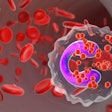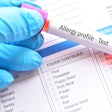
bioAffinity Technologies, Inc. announced publication of “Detection of Early-Stage Lung Cancer in Sputum Using Automated Flow Cytometry and Machine Learning” detailing results of the company’s clinical trial for its non-invasive diagnostic CyPath Lung in Respiratory Research.
“CyPath Lung uses an automated flow-based approach combined with machine learning that can be put into routine lab use without requiring expert evaluation of samples or being subject to operator bias”
CyPath Lung showed 92% sensitivity and 87% specificity in high-risk patients who had nodules smaller than 20 mm or no nodules in the lung, with an area under the ROC curve of 94%. Overall, the test resulted in specificity of 88% and sensitivity of 82%, similar to far more invasive procedures currently used to diagnose lung cancer. More than half of those in the cancer cohort had early Stage I or II lung cancer. CyPath Lung detected multiple forms of cancer including adenocarcinoma, squamous cell carcinoma and small cell lung cancer.
“The fact that CyPath Lung can accurately predict lung cancer at an early stage in patients with small nodules is particularly important. Findings of lesions between six and 20 mm as a result of lung cancer screening can lead to unnecessary invasive procedures or a ‘watchful waiting’ period for patients,” said Vivienne Rebel, MD, PhD, bioAffinity chief medical and science officer and executive vice president. “Our test is intended for use with patients who display these indeterminant nodules to increase the accuracy of lung cancer screening and provide certainty for patients and their physicians.”
“CyPath Lung uses an automated flow-based approach combined with machine learning that can be put into routine lab use without requiring expert evaluation of samples or being subject to operator bias,” said Madeleine Lemieux, PhD, who is first author and led development of the automated analysis used in CyPath Lung. “The entire sample is rapidly analyzed which ensures maximal sensitivity. The automated, numerical analysis captures complex interactions between lung cancer and the micro-environment to reliably predict the presence of lung cancer that would not be possible for even expert individuals to do from visual flow data.”
Before working with bioAffinity Technologies, Dr. Lemieux was a computational biologist at the Dana Farber Institute and Harvard Medical School. She has contributed to more than 40 publications leveraging data from high-throughput platforms. Dr. Lemieux and Dr. Rebel began their successful collaboration during their doctoral studies.
CyPath Lung uses flow cytometry, a method able to interrogate individual cells in a fraction of a second, and automated analysis to identify parameters in sputum that are indicative of cancer. Unlike genomic or other molecular markers used in liquid biopsies, bioAffinity’s CyPath technology does not collect genetic material for evaluation. Instead, CyPath Lung analyzes the lung micro-environment and identifies whole cell populations that indicate cancer is present in the lung.























